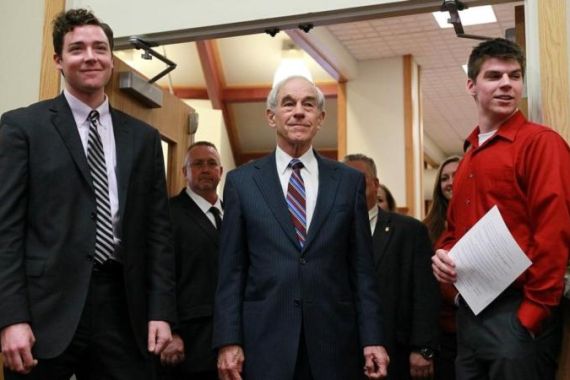Ron Paul suspends US presidential campaigning
Congressman who led a doggedly persistent bid for Republican nomination is instead opting to work on amassing delegates.

Ron Paul, the US congressman who led a doggedly persistent presidential bid against presumptive Republican nominee Mitt Romney and other rivals, has said that he is suspending active campaigning.
In an email on Monday to supporters, Paul said he will “no longer spend resources campaigning in primaries in states that have not yet voted. Doing so with any hope of success would take many tens of millions of dollars we simply do not have.”
Paul said he is instead opting to work on amassing delegates to the party’s national convention, even though his chances of winning the nomination are virtually nil.
He said his team “will continue to work in the state convention process” and seek to win delegates in order to “carry a strong message” to the Republican National Convention in Tampa, Florida in late August.
“This campaign fought hard and won electoral success that the talking heads and pundits never thought possible. But, this campaign is also about more than just the 2012 election,” said Paul.
Paul has 104 delegates, behind Mitt Romney’s 966, with 1,144 delegates needed to secure the nomination.
The unorthodox Paul, some of whose stances on legalising drugs, decimating military spending and ignoring Iran’s nuclear programme are anathema to Republicans, did not win a single state contest in the months-long battle for the nomination.
But his campaign electrified young voters turned off by years of war and skyrocketing deficits. And his fellow Republican contenders were forced to take notice.
Paul always acknowledged his latest White House bid was a long shot, and that part of his motivation for running was a desire to get Americans focusing on issues he thought were being neglected, such as US foreign policy, “constant wars overseas” and the US Federal Reserve.
After coming in third in Iowa and second in New Hampshire, Paul shot unexpectedly into the mainstream.
Few believed Paul could parlay his support into enough delegates to win the nomination, but party elders have been careful not to trample his ideas in case he bolts altogether and launches a third-party presidential bid.
Romney’s two main challengers, religious conservative Rick Santorum and former House speaker Newt Gingrich, dropped out in April and May, respectively, leaving Paul as Romney’s lone Republican opponent for the past two weeks.